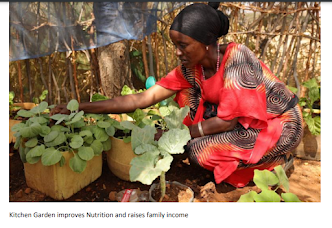Growing a Brighter Future with School Gardens
In the heart of rural Kenya, a quiet revolution is taking place—one seed at a time. Through a powerful partnership between The SOL Foundation and the Soil, Water & Environmental Conservation Foundation (SWECF), school gardens are flourishing, transforming not just landscapes but also lives. These gardens are about more than just food; they are about resilience, education, and empowerment.
Planting the Seeds of Change
The SOL Foundation’s mission to empower communities is exemplified through its collaboration with SWECF. Together, we’ve established thriving school gardens that tackle hunger, improve education, and teach sustainable farming.
These gardens provide fresh produce for school meals, ensuring children receive essential nutrition. Teachers have observed that well-fed students are more attentive, energized, and motivated to attend classes. The gardens also double as hands-on classrooms where students learn skills such as soil management, planting techniques, and water conservation. This practical knowledge is shared at home, helping families adapt sustainable farming practices and improve their own food security.
The project doesn’t stop at schools. It inspires whole communities by offering a hub for agricultural education and innovation. Farmers visit the gardens to learn modern techniques, and parents volunteer their time, strengthening community bonds.
Growing Impact Beyond the Gardens
With Kenya facing challenges like climate change and food insecurity, these gardens are a lifeline. They introduce sustainable practices like water conservation and climate-resilient crops, ensuring long-term benefits even in harsh conditions. The gardens foster a culture of self-sufficiency, where communities are equipped with the tools to overcome adversity.
The ripple effects of this initiative are profound. Improved nutrition boosts academic performance, knowledge-sharing uplifts entire families, and community collaboration strengthens social ties. Moreover, the economic benefits of selling surplus produce help schools fund educational resources, ensuring the gardens contribute to a brighter future in multiple ways.
A Partner for Sustainable Change
Partnering with The SOL Foundation offers unique benefits to communities and organizations alike. By working together, partners gain access to proven strategies for community empowerment, sustainable solutions, and a global network of supporters. From providing clean water and education to combating hunger through initiatives like school gardens, The SOL Foundation focuses on creating lasting, scalable change.
For communities like those in Kenya, partnerships with The SOL Foundation have unlocked new opportunities, instilling hope and self-reliance. To learn more about these impactful projects, visit the SWECF partnership page.
Join Us in Cultivating Change
The SOL Foundation and SWECF’s school gardens show how collaboration can transform lives. These vibrant spaces are more than fields of crops; they are symbols of resilience, community, and progress.
Want to get involved? Explore our blog at The SOL Foundation Blog, or partner with us to make a difference. Together, we can continue planting the seeds of hope and growing a brighter tomorrow. 🌱
......................................................................................................................................................
Website: https://www.the-sol-foundation.org/
Instagram: https://www.instagram.com/thesol_foundation/
Facebook: https://www.facebook.com/thesolfoundationorg/
TikTok: https://www.tiktok.com/@thesolfoundation




.jpeg)
